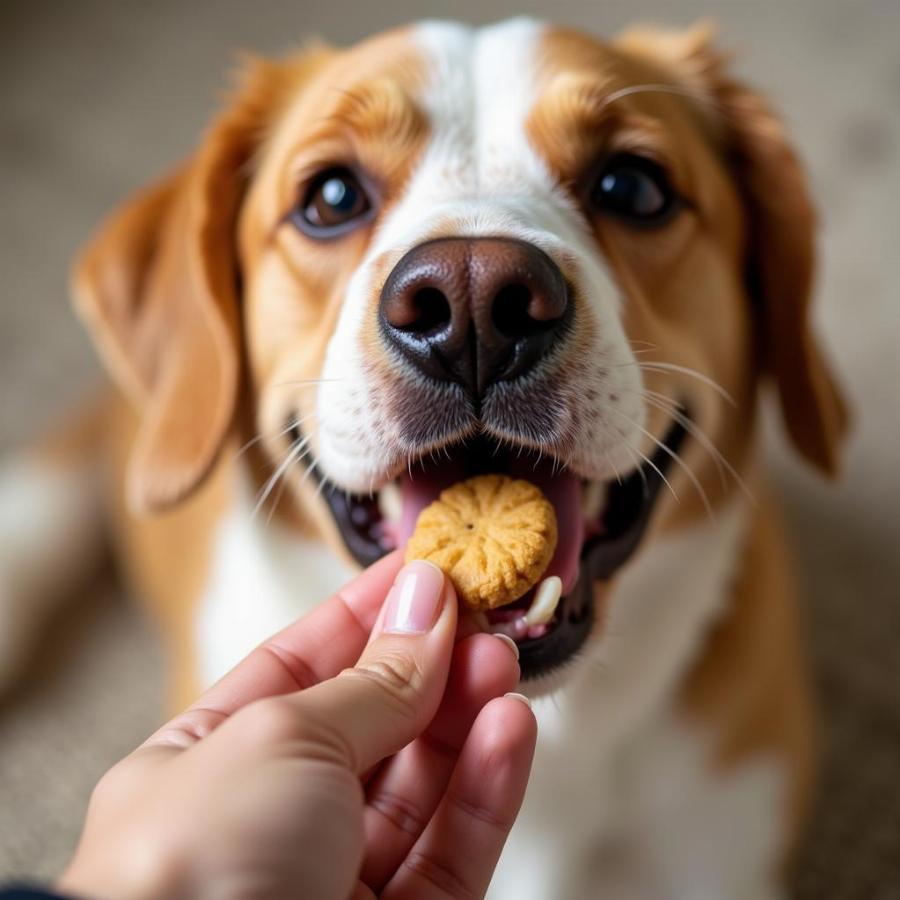Lemongrass is a popular ingredient in many dishes and also used in some essential oils and insect repellents. But is lemongrass toxic to dogs? This is a crucial question for dog owners, especially with the increasing use of natural products in our homes and gardens. The answer is a little complex and requires a closer look at different forms of lemongrass and how dogs might be exposed to them.
Understanding the Risks of Lemongrass for Dogs
While lemongrass generally isn’t considered highly toxic to dogs, it can still cause some unpleasant reactions, particularly if ingested in large amounts. The primary concern stems from the citral and other essential oils found in lemongrass. These compounds can irritate a dog’s digestive system, leading to vomiting, diarrhea, and loss of appetite. Additionally, direct contact with lemongrass oil can cause skin irritation and redness.
What Forms of Lemongrass Pose a Risk?
The toxicity of lemongrass to dogs varies depending on the form. Pure lemongrass essential oil is the most potent and therefore poses the greatest risk. Even small amounts can be harmful. Lemongrass plants themselves are less concentrated, but consuming large quantities can still cause problems. Lemongrass used in cooking, however, is typically considered safe in small amounts.
Symptoms of Lemongrass Toxicity in Dogs
If your dog has ingested a large amount of lemongrass, particularly in the form of essential oil, watch for the following symptoms:
- Vomiting
- Diarrhea
- Drooling
- Loss of appetite
- Lethargy
- Skin irritation (upon direct contact)
What to Do If Your Dog Ingests Lemongrass
If you suspect your dog has ingested a significant amount of lemongrass, contact your veterinarian immediately. They can provide guidance based on your dog’s size, breed, and the amount ingested. Do not induce vomiting unless instructed to do so by your veterinarian.
Safer Alternatives to Lemongrass for Dogs
Looking for natural ways to repel insects without risking your dog’s health? Consider these safer alternatives:
- Dog-safe insect repellents: Look for products specifically formulated for dogs, containing ingredients like pyrethrins or permethrins (use with caution and as directed).
- Cedar oil: Cedar oil is generally considered safe for dogs and can be effective in repelling fleas and ticks. Check out our article on natural flea and tick treatment for dogs.
- Diatomaceous earth (food-grade): This natural powder can help control fleas and other insects in your yard.
Can Dogs Eat Lemongrass in Food?
Small amounts of lemongrass used as a flavoring in food are generally considered safe for dogs. However, it’s important to remember that every dog is different. Some dogs may be more sensitive to lemongrass than others. If you’re unsure, it’s always best to err on the side of caution and avoid feeding your dog food containing lemongrass. For more information on safe foods for your dog, visit our article on how to get rid of fleas on dogs with natural remedies.
Lemongrass and Mosquito Repellents
Many mosquito repellents utilize citronella or other essential oils, sometimes including lemongrass. These products should never be applied directly to dogs. The concentrated oils can be extremely harmful if absorbed through their skin. Instead, opt for dog-safe mosquito yard sprays. Learn more in our article about mosquito yard spray safe for dogs.
 Dog Enjoying a Lemongrass-Scented Treat (Safe Version)
Dog Enjoying a Lemongrass-Scented Treat (Safe Version)
Conclusion
While small amounts of lemongrass in food are generally not a concern, concentrated forms like essential oils can be toxic to dogs. Always err on the side of caution and keep lemongrass essential oil out of your dog’s reach. Choose dog-safe alternatives for insect repellent and consult your veterinarian if you suspect your dog has ingested a potentially harmful amount of lemongrass. Is lemongrass safe for dogs in all forms? Definitely not. Being informed is the key to keeping your furry friend happy and healthy. Learn more about citronella plants and their safety for dogs in our dedicated article: are citronella plants safe for dogs?
FAQ
- What should I do if my dog licks a small amount of lemongrass essential oil? Contact your veterinarian immediately.
- Can I use lemongrass essential oil diffusers around my dog? It’s best to avoid diffusing lemongrass essential oil in areas where your dog spends time.
- Are there any breeds of dogs more susceptible to lemongrass toxicity? While there isn’t specific breed susceptibility, smaller dogs are generally more vulnerable to toxins due to their size.
- Is lemongrass safe for cats? Similar to dogs, lemongrass essential oil can be toxic to cats.
- Can I plant lemongrass in my yard if I have a dog? If your dog is prone to chewing on plants, it’s best to avoid planting lemongrass.
- What are some symptoms of skin irritation from lemongrass oil in dogs? Redness, itching, and inflammation.
- Are there any dog-friendly essential oils for insect repellent? Always consult with your veterinarian before using any essential oils around your dog.
Related Topics
You might also be interested in reading more about:
- Dog-friendly gardening
- Natural remedies for dog ailments
- Creating a safe home environment for your pet
Beaut Dogs is your trusted source for comprehensive and reliable information on all aspects of dog ownership. From breed selection to expert care guides, we are dedicated to providing valuable insights into the world of canines. For personalized advice and answers to your specific questions, please contact us via Email at [email protected]. Beaut Dogs is committed to helping you provide the best care for your beloved canine companion. Visit us at https://beautdogs.com to learn more!